
The Syngnathidae is a family of fish which includes seahorses, pipefishes, and seadragons. The name is derived from Greek, σύν (syn), meaning "together", and γνάθος (gnathos), meaning "jaw". This fused jaw trait is something the entire family has in common.

Pipefishes or pipe-fishes (Syngnathinae) are a subfamily of small fishes, which, together with the seahorses and seadragons, form the family Syngnathidae.

Syngnathus is a genus of fish in the family Syngnathidae found in marine, brackish and sometimes fresh waters of the Atlantic, Indian and Pacific Ocean. Fossils of these species are found from the Oligocene to the Pleistocene. They are known from various localities of Greece, Italy, Germany and United States.
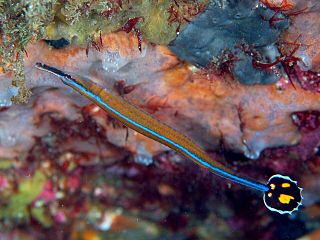
Doryrhamphus and Dunckerocampus, popularly known as flagtail pipefish, are two genera of fishes in the family Syngnathidae. They are found in warm, relatively shallow waters of the Indo-Pacific, with a single species, D. paulus, in the eastern Pacific. Most of these pipefishes are very colourful, and are fairly popular in the marine aquarium hobby despite requiring special care and not being recommended for beginners.
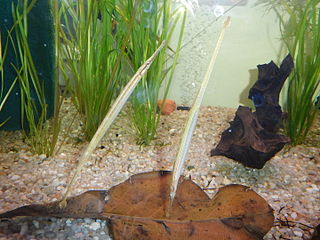
Microphis is a genus of pipefishes within the family Syngnathidae. Members of this genus are notable among the Syngnathidae for residing in mainly fresh and brackish waters. Adults breed in coastal rivers, streams, or lakes, and fertilized eggs are carried by the male pipefish in a brood pouch extending along his entire ventral surface.

Corythoichthys is a genus of pipefishes of the family Syngnathidae. All species in the genus are found in the tropical Indian and Pacific Oceans on reefs or rubble bottoms. Relationships and taxonomy within the genus are still in debate, but there may be at least 23 species.

Doryrhamphus is a genus of pipefishes, one of the two genera colloquially known as flagtail pipefishes and are popular in the aquarium trade. The members of this genus are native to the Indian and Pacific Oceans where they inhabit reef environments. The species in this genus have a maximum length of 14 centimetres (5.5 in) or less, with D. janssi being the only species that surpasses 8.5 centimetres (3.3 in). Most species have a horizontal blue line along their body, and all have a whitish-edged tail that is marked contrastingly with black, red or yellow.
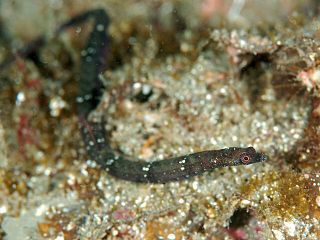
Halicampus is a genus of pipefishes of the family Syngnathidae, containing 12 described species.

Siokunichthys is a genus of pipefishes native to the Indian and Pacific Oceans. One species, Siokunichthys nigrolineatus, has a commensal relationship with mushroom corals of the genus Fungia.
Choeroichthys is a genus of pipefishes of the family Syngnathidae native to the Indian and Pacific Oceans.
Hippichthys is a genus of pipefishes native to the Indian and Pacific Oceans and the landmasses around them. This genus contains freshwater, brackish water and marine species.
Anarchopterus is a genus of pipefishes native to the western Atlantic Ocean.
Bhanotia is a genus of pipefishes native to the Indian and Pacific Oceans.
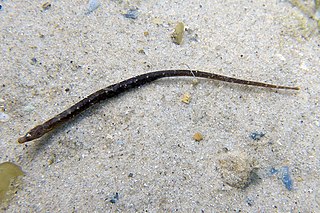
Campichthys is a genus of pipefishes native to the Indian and Pacific Oceans.
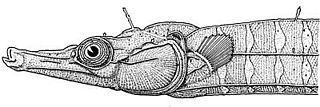
Cosmocampus is a genus of pipefishes.
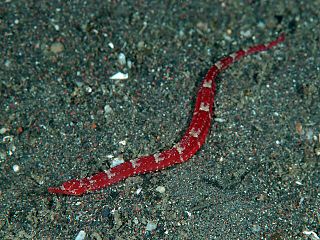
Festucalex is a genus of fish in the family Syngnathidae native to the Indian and Pacific Ocean.
Hypselognathus is a genus of pipefishes endemic to Australia where they are only known from the southern coast.
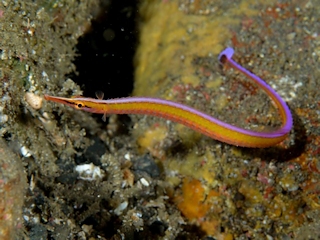
Maroubra is a genus of pipefishes with one species, M. perserrata, endemic to Australia and the other, M. yasudai, endemic to Japan.
Micrognathus is a genus of pipefishes, with these currently recognized species:
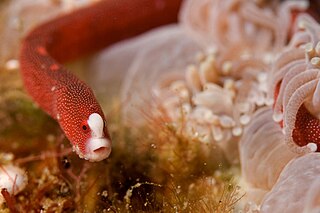
Bulbonaricus brauni is a species of marine fish of the family Syngnathidae. It is found in the Eastern Indian Ocean, from Indonesia to Western Australia, and off the Ryukyu Islands of Japan. It lives among coral reefs at depths of 1-10m, and can grow to lengths of 5.5 cm. This species is ovoviviparous, with the males carrying eggs in a brood pouch until they hatch. The specific name honours "the collector" Mr J. Braun who brought the living holotype to the Western Australia Museum.












